Posts Tagged ‘Boston’
Defective Drug Warning: Reumofan Diet Supplements
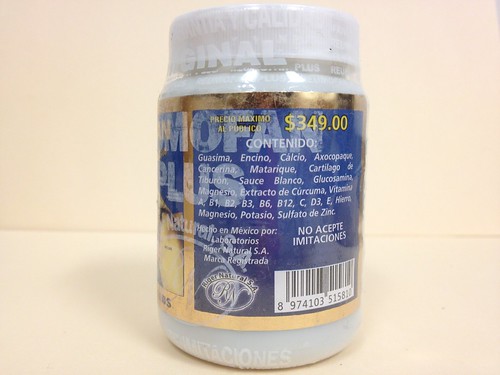 Those who take so-called “natural dietary supplements” want to listen to the Food and Drug Administration’s (FDA) latest alert on Reumofan Plus and Reumofan Plus Premium, which have now been linked to cases of death and stroke.
Those who take so-called “natural dietary supplements” want to listen to the Food and Drug Administration’s (FDA) latest alert on Reumofan Plus and Reumofan Plus Premium, which have now been linked to cases of death and stroke.
“Consumers who are currently taking Reumofan Plus or Reumofan Plus Premium, or who have recently stopped taking it, should immediately consult a health care professional,” said Elizabeth Miller, Pharm.D., acting director of FDA’s Division of Non-Prescription Drugs and Health Fraud.
The FDA issued its first alert on the dangers of Reumofan Plus on June 1, stating the drug had several active pharmaceutical ingredients not listed on the label. This week, the agency issued an updated alert for both the drug and Reumofan Plus Premium, saying it had since received reports of death, stroke and these symptoms:
- Severe bleeding in the gastrointestinal tract
- Dizziness
- Insomnia
- High blood sugar levels
- Problems with liver and kidney functions
- Corticosteroid withdrawal syndrome
These defective products are marketed as natural dietary supplements which treat arthritis, muscle pain, osteoporosis and bone cancer. If not properly supervised by a medical professional, those who stop taking the supplements can face serious withdrawal symptoms.
The defective drugs may contain corticosteroids and abrupt discontinuation can supress the adrenal glands, which regulate a number of hormone and body functions. Users could experience fatigue, low blood sugar levels, fainting and other symptoms.
The Reumofan products are manufactured in Mexico by Riger Naturals and sold on the Internet, flea markets and some retail outlets. The Mexican Ministry of Health has also issued a health warning to its citizens and ordered Riger Naturals to recall the products.
FDA testing of Reumofan Plus and Reumofan Plus Premium show they contain two ingredients which require prescriptions: diclofenac sodium and methocarbamol. Reumofan Plus also contained dexamethason, a type of corticosteroid.
The FDA offers consumers these tips for avoiding defective and dangerous drugs:
- Be wary of off-the-counter products which only have prescription counterparts.
- Be cautious when a label has a foreign language.
- Be aware that so-called “natural dietary supplements” are not subject to the same FDA pre-market review as prescription drugs and some over-the-counter drugs.
Related:
- Reumofan Products Pose Risk to Consumers, Food and Drug Administration.
- Dietary Supplements, Food and Drug Administration.
Recalled Heart Device and Similar Model Under FDA Watch
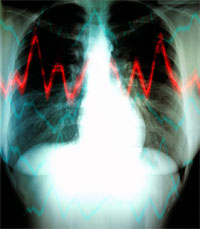 The Food and Drug Administration (FDA) has ordered St. Jude’s Medical to expand studies into Durata defibrillator leads, saying the heart devices are sufficiently similar to Riata leads, which were recalled last year. The agency is also seeking new data on Riata.
The Food and Drug Administration (FDA) has ordered St. Jude’s Medical to expand studies into Durata defibrillator leads, saying the heart devices are sufficiently similar to Riata leads, which were recalled last year. The agency is also seeking new data on Riata.
Defibrillators are implanted in patients with abnormal heart rhythms to regulate the heart beat. The medical devices are connected to the heart with leads. Riata was recalled because in some cases, wires were breaking through the insulation, which can potentially lead to a life-threatening abnormal heart rhythm.
A recent St. Jude study of 700 Riata patients found the defective wire broke through the insulation in about 19 percent of cases. A study led by a Minneapolis Heart Institute cardiologist has linked Riata leads to 20 deaths.
St. Jude, of St. Paul, Minnesota, pulled the defective Riata leads off the market in December 2010 and the FDA issued a medical device recall in late 2011. A 2011 count found 79,000 patients were still implanted with the Riata leads.
Responding to the FDA order, St. Jude said it is already collecting data on both Riata and Durata. The company stated the medical devices are different in design and a new coating meant to protect the insulation.
The FDA’s orders include routine X-rays for patients enrolled in post-market Durata studies to identify any insulation problems. St. Jude must also perform X-rays in a three-year post-market study on the defective Riata leads. The goal is to detect extruded leads which are floating loose in the heart.
Surgery to remove extruded leads can be dangerous. St. Jude says many patients live with the loose wires and continue to function normally. The FDA has advised doctors to closely monitor patients.
Related:
- FDA Orders Review of Heart Devices, The Wall Street Journal.
- Riata patients should get X-rays, FDA says, Star Tribune.
- Doctors grapple with FDA advice for troubled heart wire, Fox News.com.
Dog Attacks: Pit Bull Ordinances Nullified Under New State Law
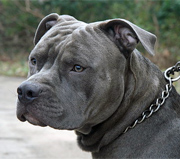 State lawmakers have handed cities and towns with pit bull ordinances a set back after passing a new animal control law which says no regulation may be specific to breed.
State lawmakers have handed cities and towns with pit bull ordinances a set back after passing a new animal control law which says no regulation may be specific to breed.
Boston, Lowell and Worcester are among the Massachusetts communities which have implemented pit bull ordinances in the past 10 years. None of the communities will be grandfathered under the legislation, “An Act Further Regulating Animal Control.” Gov. Deval Patrick signed the bill into law Aug. 2 and it takes effect Oct. 31.
Boston enacted its pit bull ordinance in 2004 and it serves as the model for many other local communities seeking to reduce dog bites and attacks. The ordinance states dogs must be muzzled outside the owner’s private home, apartment and car. All dogs in Boston are required to be leashed off their owner’s property.
Under the pit bull ordinance, the owner must post a sign alerting the public and guests that there is a pit bull on the premises. Additionally, a dog owner may not register or keep more than two pit bulls.
If the pit bull owner is renting an apartment, the landlord must sign off written permission, which must then be presented to the city’s Animal Control Officer.
Worcester and Lowell have similar ordinances to prevent dog bites and attacks, but they also require pit bulls be spayed and neutered. Lowell’s ordinance began in July 2011, according to the Lowell Sun. Local law enforcement is still assessing the impact. But one visible change is more pit bull owners are registering their animals with the city. In the last six months of 2011, 30 pit bulls were registered with the city, according to the city clerk. In 2012, 56 pit bulls have been registered.
Worcester officials report the opposite since their ordinance took effect on April 1, 2011, according to the Telegram & Gazette. The Worcester city clerk’s office reports in 2012, there were 221 licensed pit bulls in the city and an estimated 275 unlicensed. The number of registered pit bulls now stands at fewer than 70.
The city is still awaiting figures on recent dog attacks. But it implemented the law after a surge in dog attacks and figures which showed more than half involved pit bull attacks.
From Sept. 30, 2008 to Sept. 30, 2009, the city received 55 complaints of dog attacks or fear of a dog attack; 29 involved pit bulls. Police department figures further showed pit bulls were involved in 25 percent of the city’s dog bites over a two-year period.
The new state law also includes other changes to animal control regulations, including providing standards for how police chiefs handle dogs deemed dangerous and establishes a Homeless Animal Prevention and Care Fund, which will be funded by voluntary donations on state tax returns.
Related:
Worcester pit bull regulations nullified, Telegram & Gazette.
New state law could maul Lowell’s pit-bull ordinance, Lowell Sun.
Bill S.2192, An Act further regulating animal control.
Read More
Defective Dehumidifiers Recalled by Sears and Kmart
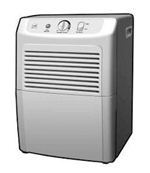 Sears, Roebuck and Co. and Kmart Corp. have issued a large product recall for dehumidifiers which can overheat, smoke, melt and catch on fire.
Sears, Roebuck and Co. and Kmart Corp. have issued a large product recall for dehumidifiers which can overheat, smoke, melt and catch on fire.
The voluntary recall, issued in cooperation with the Consumer Product Safety Commission (CPSC), is for 795,000 Kenmore Dehumidifiers. The devices were manufactured by LG Electronics (TIanjin) Appliance Co. Ltd., of Tianjin, China.
There have been 107 reports of incidents involving injury, including three cases of smoke inhalation. The humidifiers have caused more than $7 million in property damage.
The product recall covers 35-, 50- and 70-pint dehumidifiers which were manufactured between 2003 and 2005. They were sold at Sears and Kmart stores nationwide as well as the stores’ websites from 2003 to 2009 for between $140 and $220.
If you suspect you have a defective device, click the link below to see if your product model number is on the list and how to contact the store. Consumers who own a defective device are advised to immediately stop using it and unplug it. They will be compensated with a gift card which can be used at Sears or Kmart, as well as with a $25 coupon to purchase a new device at Sears.
LG Electronics Tianjin Appliance Co. issued another dehumidifier recall in 2009 and again in 2011 for 98,000 units. The Goldstar and Comfort-Aire dehumidifiers had a power connector which could short circuit, posing a fire risk. The company issued that recall after receiving 11 reports of property damage totaling more than $1 million. A Hudson, Mass. sustained $183,000 in damage from one of the defective dehumidifiers.
Those dehumidifiers were sold at The Home Depot, Walmart and Heat Controller Inc. nationwide from January 2007 and June 2008. In that case, consumers were advised to stop using the defective products and contact LG to arrange a free repair at an authorized service center.
Related:
Sears Recalls Kenmore Dehumidifiers Due to Fire and Burn Hazards, Consumer Product Safety Commission.
Dehumidifiers Recalled by LG Electronics Tianjin Appliance Due to Fire and Burn Hazards, Consumer Product Safety Commission.
Consumer Product Safety Commission.
Product Liability, Breakstone, White & Gluck.
Read More
Product Liability: Magnet Desk Toy is Children’s Choking Hazard
 The Consumer Product Safety Commission (CPSC) has taken a rare legal action seeking to stop sales of a magnet desk toy, alleging children are swallowing the pieces, then suffering serious injuries requiring surgery.
The Consumer Product Safety Commission (CPSC) has taken a rare legal action seeking to stop sales of a magnet desk toy, alleging children are swallowing the pieces, then suffering serious injuries requiring surgery.
The CPSC filed an administrative complaint on July 25 against Maxfield & Oberton Holdings LLC, of New York, N.Y., the maker of Buckyballs and Buckycubes. The government agency and company failed to agree on the CPSC’s proposed voluntary recall plan for the magnet sets with 216 units.
The CPSC alleges the popular desk furnishing contains a defect in design, packaging, warnings and instructions. It wants the company to stop selling the defective product, notify the public about potential for injury and offer consumers a full refund. It is the CPSC’s second time taking this type of legal action in 11 years.
The CPSC is intervening after receiving more than two dozen of reports young children and teenagers have swallowed the magnets, requiring surgery. At least a dozen involved Buckyballs.
When two or more magnets are swallowed, they can move toward each other through the stomach and intestinal walls, resulting in serious injuries such as holes in the stomach, intestinal blockage, blood poisoning and possible wrongful death.
The CPSC reports young children are removing the magnets from the kits and placing them in their mouth. Meanwhile, older children and teenagers have unintentionally swallowed the magnets while placing them in their mouths to mimic having a tongue ring.
At least 10 retailers, including Amazon.com, have agreed to stop selling the defective product. EBay is also removing these listings from its online marketplace.
In May 2010, the CPSC and Max & Oberton conducted a cooperative recall of about 175,000 Buckyball magnet sets for mislabeling. The toys were labeled “Ages 13+” and did not meet the federal toy standard that loose magnets not be sold for children younger than 14. Injury reports preceded and followed the notice.
In November 2011, the CPSC and Max & Oberton worked cooperatively to warn about the dangers that could occur, but injuries continued, leading to the CPSC’s latest action. The CPSC now says a recall is necessary because all these prior steps have been ineffective.
Related:
- CPSC Sues Maxfield & Oberton Over Hazardous Buckyballs and Buckycube Desk Toys, Consumer Product Safety Commission.
- Feds file suit against Buckyballs, retailers ban product, USA Today.
Boston’s Hubway Bike Share Expanding into Cambridge
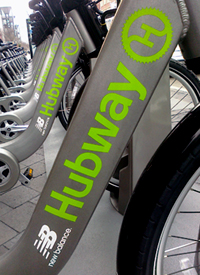 Boston’s Hubway bike share program is about to push beyond city limits, with an expansion over the Charles River into Cambridge and other communities starting as early as this week.
Boston’s Hubway bike share program is about to push beyond city limits, with an expansion over the Charles River into Cambridge and other communities starting as early as this week.
The Boston Globe reports the first of 24 new bike kiosks may start arriving in Cambridge this week and should operational by the second week in August. Somerville is slated to receive 12 stations with four planned in Brookline. The city of Boston launched the program in the summer of 2011. It now has 600 bikes for 61 stations and will add 11 new stations. With the expansion, the Boston region will have more than 1,000 public bikes available, The Boston Herald reported.
In Cambridge and Somerville, bike stations will be added at major squares and areas in between. In Brookline, new stations are coming to Coolidge Corner, Town Hall and the Brookline Village MBTA stop.
In Boston, new stations will be placed in Allston, Charlestown, Dorchester and Roxbury. Next year, Hubway may expand into Jamaica Plain, as well as Newton and Arlington, officials told The Boston Herald.
The expansion comes after a first year in which Hubway exceeded all expectations. It has seen twice as many trips and paid subscribers as planned. Over 360,000 individual bike trips have been taken since its start and this summer, tourists and commuters are taking about 2,000 bike trips per day.
The program is operated by Alta Bicycle Share in partnership with Boston Bikes, an initiative of the City of Boston. It is partially funded by the Federal Transit Administration. Outside Boston, each community and Alta Bicycle Share work together on securing grants and sponsorships to fund each bike station, which can cost $50,000.
The program offers Annual Membership for three seasons, which can be purchased online for $85. These members receive a key to unlock bikes for use. Rides under 30 minutes are covered under the membership fee; longer rides incur additional fees. Others can purchase short-term Access Passes for 24 hours or three days.
The Hubway reported few bike accidents resulting in injury during its first year. The program reported no bike accidents requiring ambulance response and only two bike accidents overall. The program’s contract requires riders to wear helmets to protect themselves in bike accidents. It encourages this by making helmets available for purchase when you buy a membership. It also has a network of retailers throughout the city who offer discounted memberships.
Related:
- Hubway, turning 1, is about to expand, The Boston Globe.
- Hubway expansion to bring another 400 bikes to roads, The Boston Herald.
- The Hubway.
- What to know about cycling in Boston, Breakstone, White & Gluck.
Drownings Claim 90 Children in U.S. Since Memorial Day
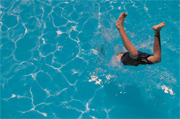 The Consumer Product Safety Commission (CPSC) reports pool drownings have claimed the lives of 90 children in the U.S. since Memorial Day, a sober reminder for parents and caregivers to review how they are protecting their youth.
The Consumer Product Safety Commission (CPSC) reports pool drownings have claimed the lives of 90 children in the U.S. since Memorial Day, a sober reminder for parents and caregivers to review how they are protecting their youth.
These figures were released for Pool Safely Day, an event being observed nationwide this week, from July 22 to July 29, 2012. In Massachusetts, the South Shore YMCA in Quincy and the Boys & Girls Club of Taunton were scheduled to host educational events.
The CPSC reported 90 children under age 15 have suffered swimming pool drownings and an additional 106 children in the same age category have required emergency response for near-drowning incidents at pools. The figures were released by the CPSC’s Pool Safely: Simple Steps Save Lives campaign.
The figures show younger children are most vulnerable, with 72 percent of the drowning victims younger than 5 years old.
Texas saw 13 drownings, the highest number nationwide through the mid-summer report, with California, New York, North Carolina, Ohio and Pennsylvania each reporting 5 swimming pool drownings.
Parents should make sure their children have taken swimming lessons and instruct them on ways to protect themselves, such as to stay away from pool drains, pipes and other openings; stay in certain areas of the pool and only use diving boards after asking parents. Children 13 and older should also be trained in CPR.
Parents and caregivers should also:
- Stay close and alert when watching children in and around the pool.
- Never leave children unattended.
- Learn CPR.
- If you own a pool or spa, make sure it has appropriate safety equipment. At pools, that includes fencing, a lockable safety cover, drain covers which match federal requirements, life rings and a reaching pool. Spas should have lockable covers for when not in use.
Click here for a full list of pool safety tips from the Boston personal injury lawyers at Breakstone, White & Gluck of Massachusetts.
Related:
- Midsummer Drowning Checkup: 90 Child Drownings Nationwide since Memorial Day, Consumer Product Safety Commission.
- Swimming Pool Accidents, Breakstone, White & Gluck.
- Pool Safely website.
- Virginia Graeme Baker Pool & Spa Safety Act, Pool Safely.
Propane Explosion Victim’s Family Settles for $7.5 Million in Norfolk Case
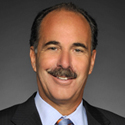 Attorney Marc L. Breakstone of Breakstone, White & Gluck in Boston has announced a $7.5 million settlement has been reached for an electrician killed in a propane gas explosion at a Norfolk, Massachusetts condominium complex.
Attorney Marc L. Breakstone of Breakstone, White & Gluck in Boston has announced a $7.5 million settlement has been reached for an electrician killed in a propane gas explosion at a Norfolk, Massachusetts condominium complex.
Breakstone and the family of William “Billy” Nichols announced the settlement on July 9, nearly two years after Nichols died in the July 30, 2010 propane explosion. Breakstone represented the Nichols family and filed a wrongful death lawsuit on their behalf against EnergyUSA Propane and Smolinsky Brothers Heating and Plumbing.
The wrongful death lawsuit alleged EnergyUSA negligently underfilled a new propane tank at the complex where Nichols had been working. By underfilling the tank, the company caused the chemical odorant to fade, making propane undetectable when it started to leak.
The wrongful death lawsuit alleged Smolinsky Brothers Heating and Plumbing carelessly failed to tighten a connection to the furnace which led to the leak of the undetectable propane gas.
Breakstone called the propane explosion a “terrible tragedy that could easily have been avoided.” Nichols, 46, of Blackstone, was buried under burning debris for 97 minutes before he was rescued by local firefighters. He was crushed by smoldering debris, had severe burns over 80 percent of his body and called on rescuers to say goodbye to his fiance and other family members. He was transported by MedFlight helicopter to Brigham and Women’s Hospital in Boston, where he died that evening from the burns and injuries.
During litigation, Breakstone said he discovered EnergyUSA Propane sold its assets to a publicly-traded energy company for $66.8 million to avoid the likelihood of paying punitive damages in a jury trial. Breakstone obtained a court-order freeze on the remaining company cash assets.
As a result of Nichols’ death, Massachusetts is expected to introduce new regulations this fall which will ensure better safety training for propane delivery personnel as well as require newly installed propane storage tanks be filled to the maximum liquid level to avoid the odorant fade problem that caused this propane explosion.
Click for coverage in The Boston Globe, WBZ-TV, WCVB and Wicked Local.
Click here to read the July 9, 2012 media release.
Click here to read the statement from Norfolk Fire Chief Coleman C. Bushnell.
Read More
Car Accident Risk Increases with Independence Day Holiday Travel
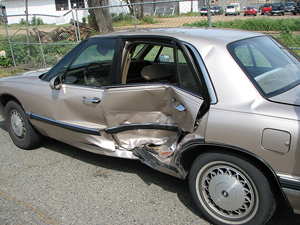 This year, the Fourth of July holiday travel is projected to increase, making it particularly important to plan and take precautions before getting behind the wheel. The AAA auto club expects a 4.9 percent rise in cars traveling 50 miles or greater. The travel will be spread out over the six days between Tuesday, July 3 and Sunday, July 8.
This year, the Fourth of July holiday travel is projected to increase, making it particularly important to plan and take precautions before getting behind the wheel. The AAA auto club expects a 4.9 percent rise in cars traveling 50 miles or greater. The travel will be spread out over the six days between Tuesday, July 3 and Sunday, July 8.
The expected Independence Day holiday travel volume will tie the past decade’s previous high mark set in 2007 and represents a near 42 percent increase from 2009.
The busiest days were expected last Friday and this coming mid-week. The National Safety Council estimates the U.S. will see 173 car accident deaths between Tuesday night and Wednesday. Some 17,300 serious personal injuries requiring medical attention were also expected.
The Boston car accident lawyers at Breakstone, White & Gluck urge drivers to be safe, plan and take precautions with these tips:
Fuel Up. Always fuel up your car before you start traveling.
Seat Belts. Seat belt use saved more than 75.000 lives from 2004 to 2008, according to the National Highway Traffic Safety Administration.
No Cell Phones. You reduce your ability to respond to potential accidents when you are talking or texting. To avoid temptation, the best plan is to ask someone else to hold your phone.
Travel Off-hours. The mid-week holiday provides more options for traveling. Consider returning Thursday or Friday rather than Saturday or Sunday.
Mass 511 Traffic Updates. Click here for traffic updates on Massachusetts car accidents and roadway conditions.
Slow Down. Make sure you are providing adequate room between yourself and the car in front of you.
Tolls. Consider signing up for a pre-pay toll program before your trip. This will allow you to use a greater number of lanes at the toll booths and reduce your chance for a car accident.
Use Your Air Conditioning. In addition to keeping everyone in the car comfortable, it will allow you to stay more alert while driving.
Tires. Make sure your tires are properly inflated before you travel a long distance. Underinflated tires can cause tires to overheat and result in a car crash.
Battery. If your car battery is over 3 years old, have it checked before you travel. Heat can cause your battery to fail.
Traveling with Children. Supply children with books to flip through or similar low-key toys to keep them occupied so they will not distract you while driving.
Drowsy Driving. If you are having trouble sleeping and drive, you could cause a serious car accident. Ask someone to take the wheel.
Emergency Kit. Stock an emergency kit with water, non-perishable food, a flashlight with extra batteries, jumper cables, road flares, a first aid kit and neon vests for all your passengers. This will make you visible to other drivers if you must exit your vehicle.
Pedestrians and Cyclists. Whether you are traveling to your holiday destination or running out to the store once you have arrived, watch out for pedestrians and cyclists on the shoulders of the road and crossing.
Related:
- AAA Projection for Independence Day Holiday Travel Ties Record for Highest Volume in Past Decade.
- Seat Belts, National Safety Council.
- AAA Provides Five Ways to Help Your Car to Survive Extreme Heat.
ATV Accidents: Resources and Safety Tips for Avoiding Them
 The all-terrain vehicles (ATVs) have returned for summer. If you ride, remember the state of Massachusetts has specialized rules for your operation designed to protect you and others.
The all-terrain vehicles (ATVs) have returned for summer. If you ride, remember the state of Massachusetts has specialized rules for your operation designed to protect you and others.
ATV riding comes with risks. Each year from 2004 to 2010, the U.S. saw an average of nearly 700 ATV-related deaths and about 136, 000 emergency department-treated injuries, according to the Consumer Product Safety Commission (CPSC). So far in 2012, the CPSC has received reports of 130 adults and 28 children under age 16 who have died in ATV accidents. The agency received reports 17 adults and children died in accidents over Memorial Day weekend.
Riders can benefit from taking a safety course and reviewing the laws. The Boston personal injury lawyers at Breakstone, White & Gluck offer these guidelines and resources:
Safety Course. The Massachusetts Environmental Police offer training classes.
Helmets. Wear a protective helmet specifically designed for ATV riding. Make sure the helmet is approved by the Snell Memorial Foundation or the Department of Transportation (DOT) testing labs.
Register Your Vehicle. You must register your ATV with the Massachusetts Environmental Police if you operate it on private or public property. You must carry proof of registration when riding. Click for more information.
Passengers. If your ATV is a single-operator model, do not carry passengers. For all other ATVs, limit yourself to the passenger capacity.
Public Roads. Do not operate on a public way, unless it is marked and approved for recreational vehicles.
Paved Roads. ATVs are not designed for use on paved roads and their solid rear axles increase the chance of tipping over when you turn.
Young Riders. Sean’s Law took effect in Massachusetts in 2010, banning children under 14 from operating ATVs. If you let your children operate, learn the specialized rules in Massachusetts. But also consider having them wait. The CPSC advises that children under age 16 lack the developmental skills to operate.
Training for Riders Under 18. These riders must complete an approved training course on safety. They must carry certification of this course when riding.
Youth on ATVs. Children should never ride an ATV designed for an adult. This is how 90 percent of injuries to children occur.
No Alcohol. Drinking and driving increases your chance of causing an accident and like motor vehicle drivers, it is against the law for ATV drivers.
Safe Riding Areas. Massachusetts offers state forests and parks designated for ATVs and off-road-vehicles. Click here for the list.
Accidents.You are required to report all accidents resulting in injuries, death or $50 or greater in damage to the Massachusetts Environmental Police.
Related:
- Snapshot: ATVs per Massachusetts Community, Boston Globe
- Does the new Massachusetts child-ATV ban go too far?, Boston Globe
- Annual Rise in Summer ATV Deaths Prompts CPSC to Urge Safety on the Trails, Consumer Product Safety Commission
- Massachusetts Environmental Police Urge Safe Off-Highway Vehicle Use

